American Health Care Concerns

Regardless of how you currently have health care in the United States — individual market coverage, employer coverage, Medicaid, or Medicare — recently proposed amendments to the health care system could affect you.
This means the debate among politicians in Washington on how to proceed with adjusting, repealing or replacing the existing system isn’t just a political issue — it’s an American issue.
Still, what makes the health care debate resonate across the country can be vastly different. To find out, we surveyed over 1,000 Americans on their thoughts and concerns about proposed changes to the U.S. health care system. From those worried about the defunding of Planned Parenthood to the citizens excited about the attempts to reduce funding for programs such as Medicaid, we collected all sides of the most pressing issues. Continue reading to see what we learned.
Why Health Care Matters
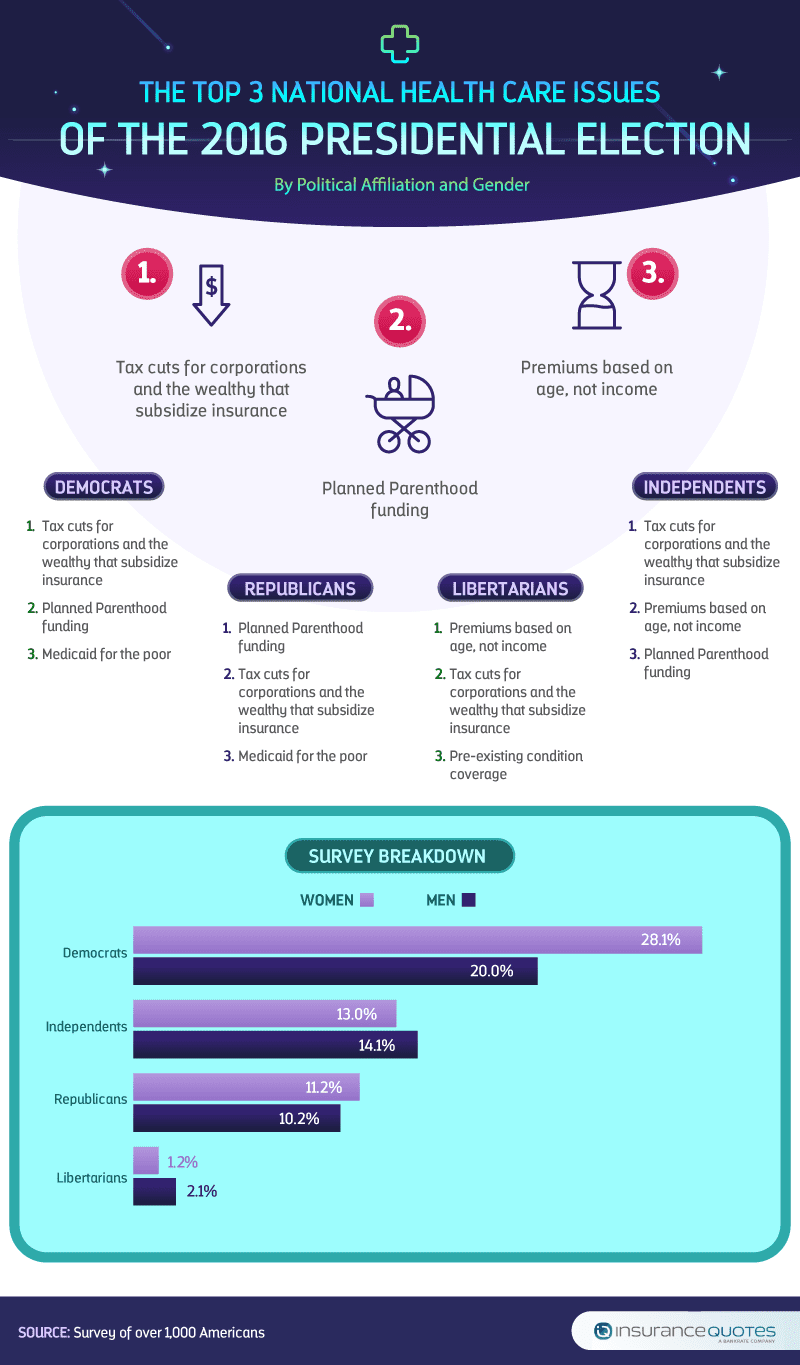
Even before the ballots were cast in the 2016 presidential election, health care ranked among the most important issues across all political parties. Of course, how to approach health care — what elements to change, replace, or even enhance — remains a closely contested debate today. Republicans in Congress have made three attempts to repeal and replace the existing Affordable Care Act and, in September 2017, Sen. Bernie Sanders, Vemont Independent, introduced a “Medicare for All” bill.
When it came to the Top 3 health care issues of the 2016 election, Democrats and independents felt tax cuts for the wealthiest Americans to help subsidize insurance were the most prevalent concern. While they were also concerned with the funding of Planned Parenthood, Democrats indicated that Medicaid for the poor was an important consideration, while independents were more worried about premiums based on age rather than income.
Republicans indicated that the status of Planned Parenthood wasn’t just an important component of health care — it was the most important. Despite its status as a priority, Planned Parenthood funding remains a debated topic.
Bridging the Gap in Health Care
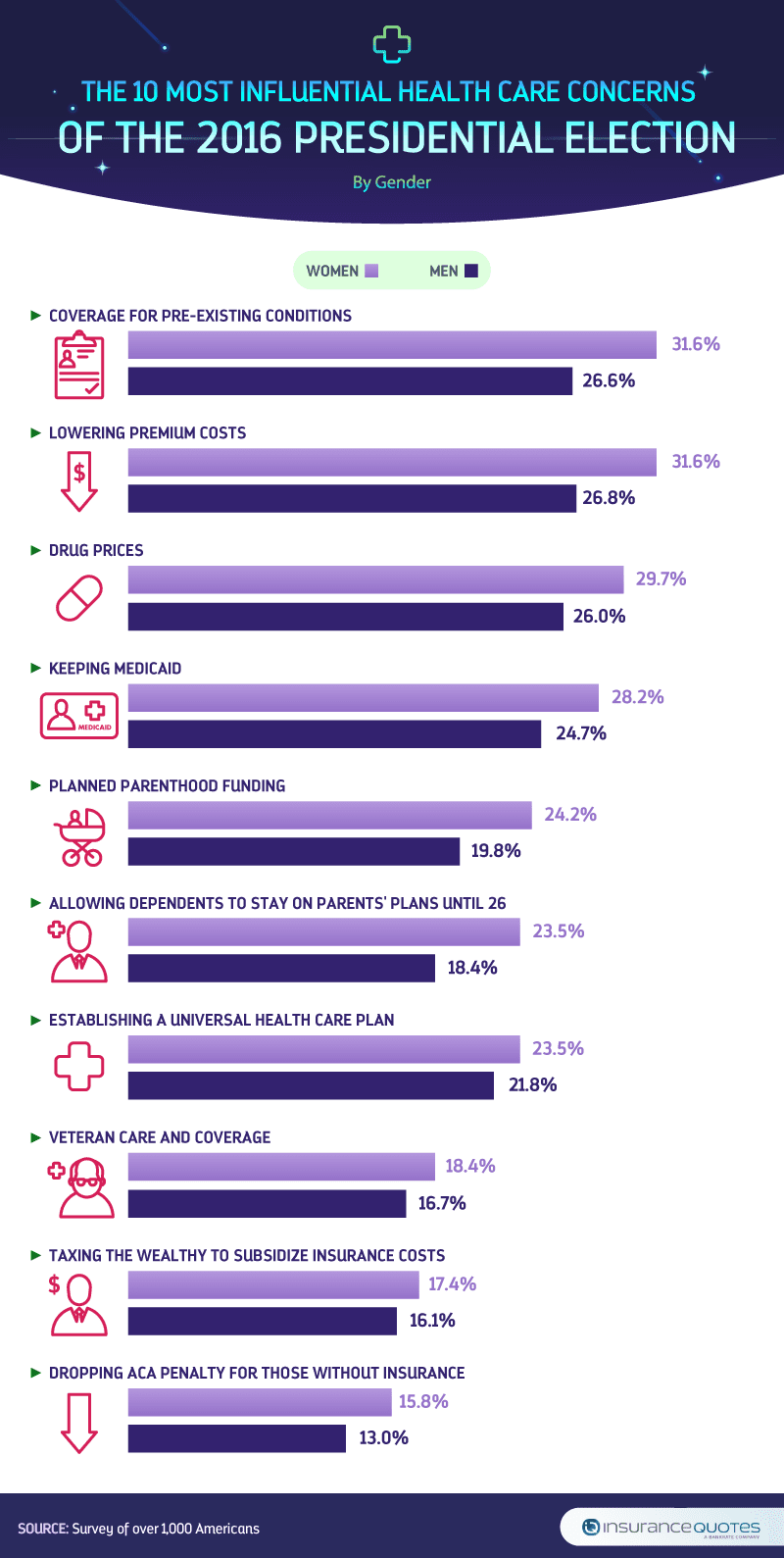
Overall, women surveyed were more concerned about American health care than men. Research has shown women may be more prone to conditions that require comprehensive health care coverage, including breast cancer and mental health issues, and have historically paid more than men for their coverage.
However, our study found the two health care issues men and women were most concerned with included maintaining coverage for pre-existing conditions and lowering premium costs. Over 24 percent of women were worried for the future funding of planned parenthood, compared to less than 1 in 5 men. The least concerning element of health care for men and women involved dropping the penalty established by the Affordable Care Act for those who go without insurance.
Perceptions of Planned Parenthood Funding
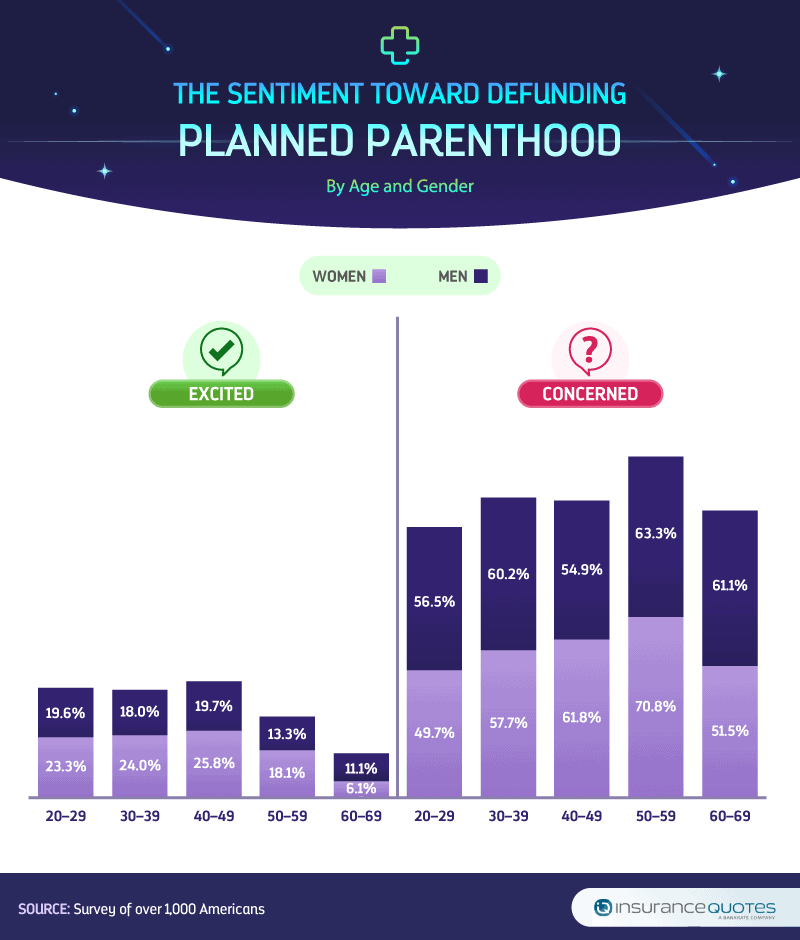
While 1 in 5 American women may utilize Planned Parenthood services over the course of their lifetime, funding Planned Parenthood is an issue that concerns all, at least according to our survey.
In early 2017, President Donald Trump overturned a key Obama-era ruling that disallowed states from defunding Planned Parenthood. While some critics argue that defunding organizations such as Planned Parenthood could negatively impact millions of low-income Americans who rely on their services for sexual health and family planning needs, others have pointed out the exact figures regarding the percentage of services rendered as abortions are largely unclear. A study conducted in 2017 revealed the ideological opinions regarding abortion still divide a vast majority of Americans.
Our study found men and women who were the most likely to be excited that Planned Parenthood might be defunded were between 40 and 49 years old. While roughly half (or more) of men and women said they were concerned Planned Parenthood might lose federal funding, those between the ages of 50 and 59 expressed the most concern. Men in their 20s, 30s, and 60s expressed more concern for the future of Planned Parenthood than women of the same age.
Perceptions of Pre-Existing Condition Coverage
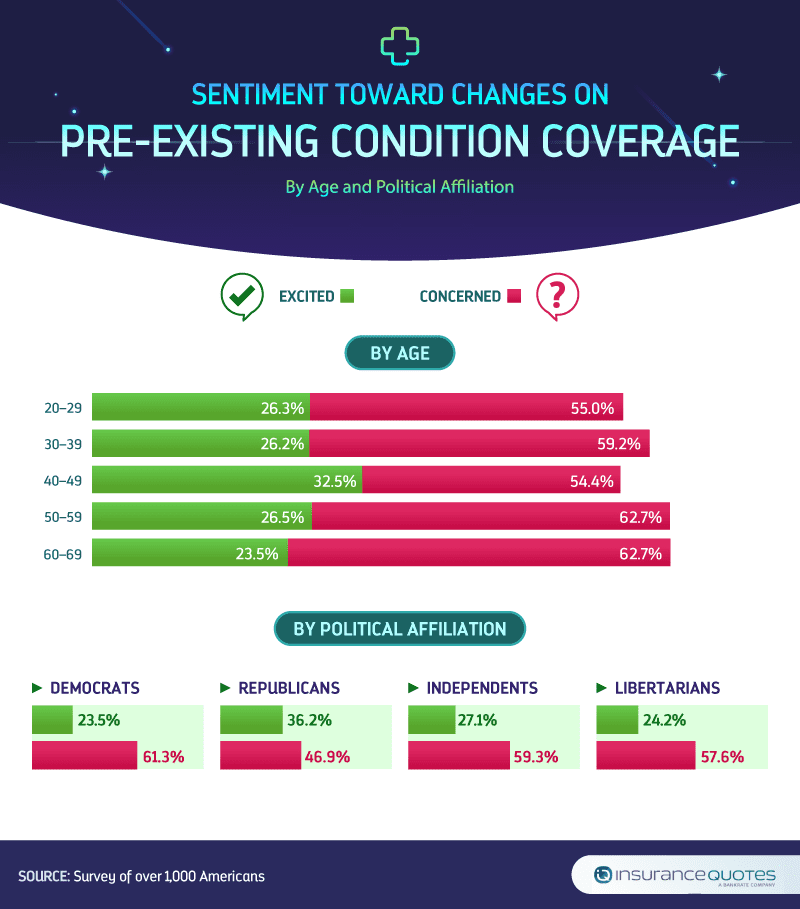
As lawmakers on both sides of the political aisle continue to propose new changes or amendments to the current U.S. health care system, one issue remains a point of contention: pre-existing conditions.
In early 2017, when Republicans proposed their first legislative changes to the Affordable Care Act, a variety of conditions (including cancer, mental health issues, and pregnancy) were among those liable to be excluded from coverage. Critics of this bill argued it could cause financial ruin for millions of low-income Americans who might be charged higher premiums by independent health care companies for their existing medical concerns. Ultimately, despite revisions and amendments regarding pre-existing conditions, the bill failed to pass through the House or Senate.
More than half of all Americans surveyed said they were concerned about pre-existing condition coverage, including nearly 63 percent of people both in their 50s and 60s. A majority of Americans expressed worry when asked about adjustments to pre-existing condition coverage regardless of their political affiliation, though over 36 percent of Republicans were excited about the potential changes.
Perception of Medicaid Coverage for Older Americans
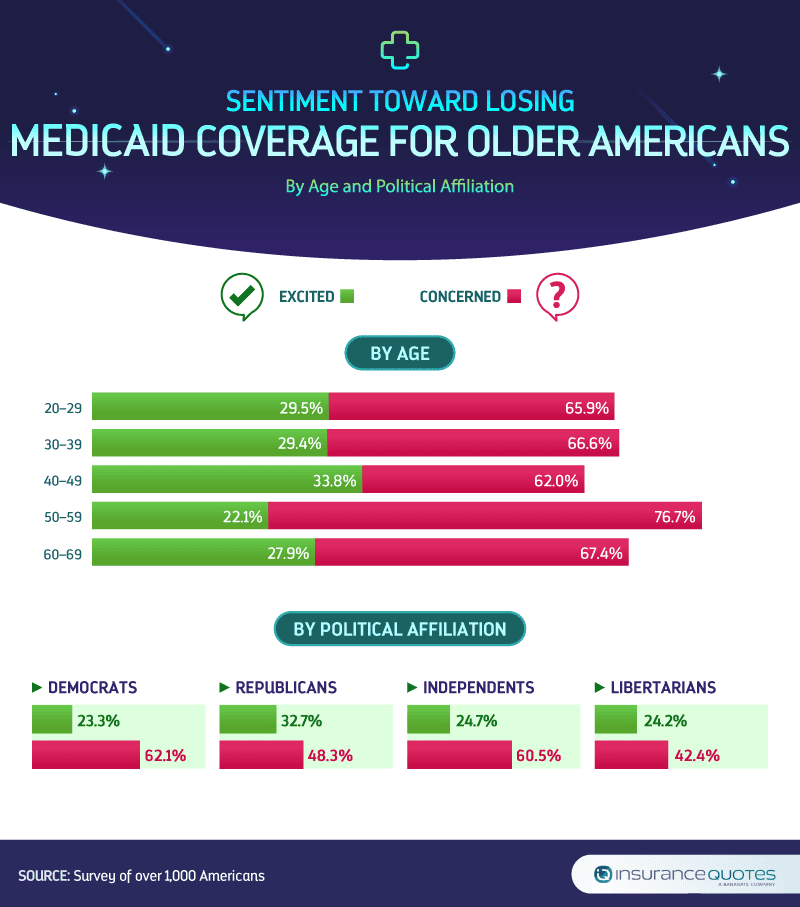
During a town hall debate in 2009, President Obama acknowledged that Medicaid and Medicare were among the biggest drivers of debt in the U.S. As the cost of Medicaid continues to rise, elements of the program have proven more costly in relation to emergency room visits. In the 2016 fiscal year, outlays for Medicaid increased by 5 percent — accounting for $18 billion added to the national deficit.
Across the nation, about 6 million older Americans are currently enrolled in Medicaid (not accounting for those aged 65 and older who are also enrolled in Medicare). Some critics argue that cuts to the program could leave the low-income elderly without sufficient means to cover the necessary care and services most Americans over 65 may require.
Our study found Democrats and Independent voters were the most concerned about potential changes to Medicaid coverage for older Americans, while nearly a third of Republicans were excited about the changes to coverage.
Perceptions of Medicaid Coverage for the Poor
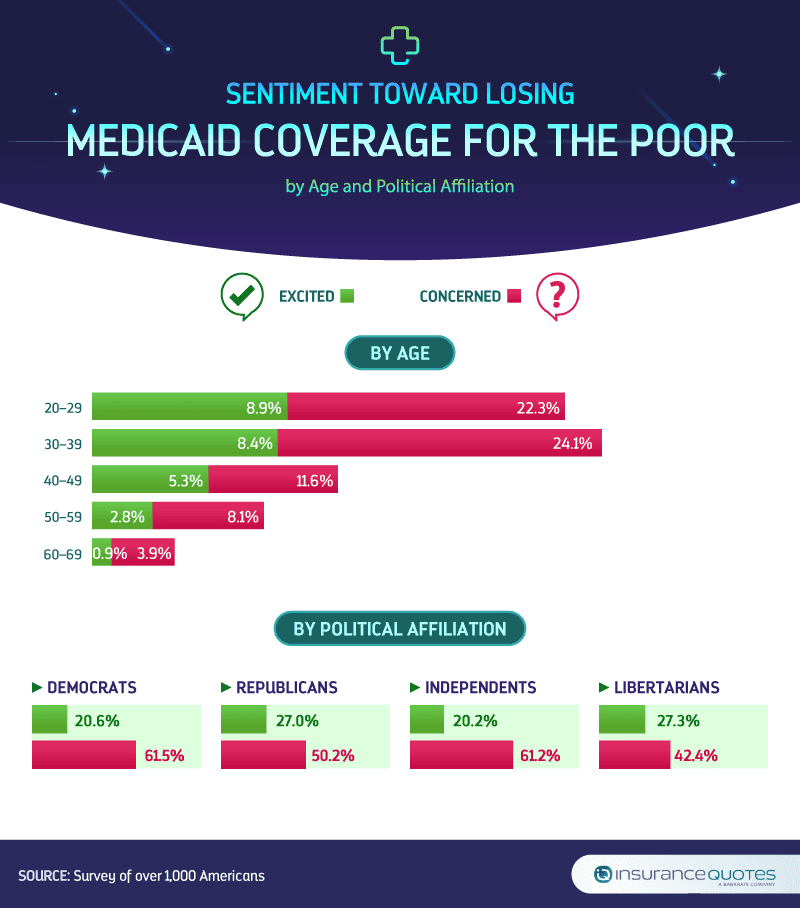
Medicaid coverage includes care for a variety of low-income families, including those who have disabilities and children with special needs. Opponents of recent proposals to reduce federal funding of Medicaid by $834 billion by 2026 argue that nearly 5 million American children currently rely on the physical therapy, community-based services, and routine care that Medicaid provides.
More than half of Republicans polled were concerned about cuts to Medicaid for low-income families, while almost 30 percent were excited for the potential changes in legislation. More than 61 percent of both Democrats and Independent voters expressed concern for the future of Medicaid.
Navigating Your Options
No matter how you feel about the health care system in place today, or the hopes and fears you may have for the future, the debate surrounding American health care isn’t going away anytime soon.
If you’re concerned about qualifying for health care coverage or want to know more about the programs you might qualify for, visit us online at insuranceQuotes. With an ever-changing health care landscape, navigating your options can feel overwhelming, but understanding your options shouldn’t be complicated. At insuranceQuotes, we provide the best in industry news, quote tools, and frequently asked questions to help you feel confident in your health care coverage. Visit us online today to learn more.
METHODOLOGY
We surveyed more than 1,000 Americans about their concerns and hopes for the future of American health care. We asked them about different aspects of the health care system and broke down their sentiment by demographics including gender, age and political affiliation.
Sources
- https://tcf.org/content/commentary/trumpcare-hurts-us/
- http://www.washingtonexaminer.com/daily-on-healthcare-today-is-preview-of-the-future-of-the-us-healthcare-debategop-senators-release-obamacare-overhaul-billsanders-to-unveil-single-payer-plan/article/2176831
- http://www.people-press.org/2016/07/07/4-top-voting-issues-in-2016-election/
- http://www.newsweek.com/senate-health-care-planned-parenthood-gamble-628414
- http://www.huffingtonpost.com/entry/obama-legacy-womens-health_us_58595b7ce4b08debb78b2c47
- http://www.npr.org/sections/health-shots/2017/08/16/543723927/often-missing-from-the-current-health-care-debate-womens-voices
- https://www.plannedparenthood.org/files/1914/0545/1511/PPMNS_by_the_numbers.pdf
- http://www.huffingtonpost.com/entry/trump-states-defund-planned-parenthood_us_58e2ac55e4b03a26a3652d3a
- https://www.washingtonpost.com/news/fact-checker/wp/2015/08/12/for-planned-parenthood-abortion-stats-3-percent-and-94-percent-are-both-misleading/?utm_term=.1735db917b8e
- http://www.pewresearch.org/fact-tank/2017/07/07/on-abortion-persistent-divides-between-and-within-the-two-parties-2/
- https://fivethirtyeight.com/features/how-defunding-planned-parenthood-could-affect-health-care/
- http://www.ajc.com/news/local/these-pre-existing-conditions-could-cost-you-big-bucks-under-new-health-care-bill/THHXBB8yUMSXV8ZugZT6FK/
- https://www.theatlantic.com/business/archive/2017/06/ahca-senate-bill-preexisting-conditions/531375/
- http://www.politifact.com/truth-o-meter/statements/2009/jun/25/barack-obama/obama-says-medicare-and-medicaid-are-largest-defic/
- https://www.forbes.com/sites/theapothecary/2016/10/20/medicaid-expansion-causes-surge-in-er-visits/#78e2b674f0f2
- http://www.nationalreview.com/corner/441205/deficit-growth-medicaid-medicare-social-security-spending-are-cause
- http://www.huffingtonpost.com/entry/trumpcares-880-billion-cut-to-medicaid-is-an-attack_us_58ca930be4b0537abd956e46
- http://www.newsweek.com/united-states-health-care-rated-worst-637114
- https://www.healthcare.gov/fees/fee-for-not-being-covered/
- http://thehill.com/policy/healthcare/342447-two-more-gop-senators-defect-on-healthcare-bill
Fair Use Statement
Are you interested in sharing our findings and continuing the conversation on health care in America? Feel free to share our study for noncommercial purposes, but please link back to give credit for our findings.
